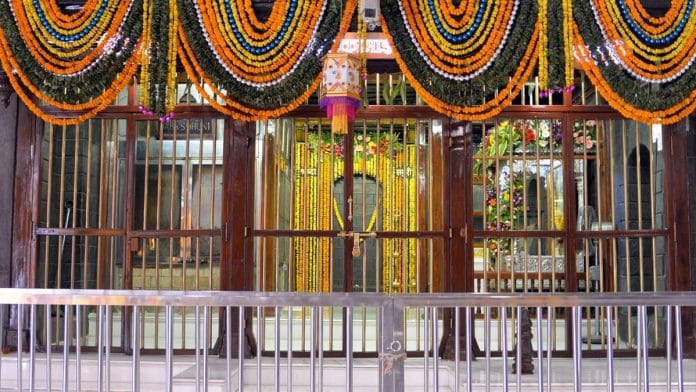Mumbai: No pradakshinas (walking around a deity as a mark of respect) or garlands in temples, no mass service or holy water in churches and no qawwalis in mosques.
Places of worship reopened in Maharashtra Monday after being shut for nearly eight months. But there are Covid-19 filters on the experience, with sanitisers, temperature checks and face masks on the long list of protocols that several major temples, mosques and churches have adopted.
Even as the Uddhav Thackeray-led Maha Vikas Aghadi government had allowed shops and establishments, offices and public transport to gradually start operations starting June, it had taken a cautious approach to reopening religious places fearing overcrowding.
The issue had become a political hot potato, with all opposition parties, especially the BJP, protesting against the continued closure of religious places in the state.
Also read: Palghar girls to Sameet Thakkar case — all Maharashtra govts tried to shut online dissent
Online bookings, Covid tests, fewer devotees
The famous Sai Baba Temple at Shirdi in Ahmednagar district has stationed a team of doctors at the entrance to check each visitor for symptoms. Anyone found having symptoms will be immediately taken to the temple trust’s Covid care centre for a test, Rajaram Thete Patil, public relations officer at the Saibaba Sansthan Shirdi Mandir told ThePrint.
The temple opened at 4:30 am Monday, which was also the day of Balipratipada (a Hindu festival that is celebrated on the day after Diwali), with about 60 people for an early morning aarti, followed by a bath of the deity. Visitors were allowed post 5:45 am.
“We are allowing just 900 visitors per hour. In a normal situation, this number used to be close to 10,000. Absolutely nothing is allowed inside. No flowers, garlands, prasad, or even mobile phones. We are sanitising the temple premises in parts every two hours,” Thete added.
At Alandi’s Sant Dnyaneshwar Temple, organisers are letting in a maximum of 400 persons inside the premises against a capacity of 1,500 to 2,000, said Vikas Dhage Patil, chief trustee at the Sant Dnyaneshwar Maharaj Sansthan Samiti.
“Every three hours, we close the temple for half an hour to sanitise it. There were long queues and crowding outside it being the first day after many months, but we have asked for the local police’s help in regulating the crowds outside,” Dhage Patil said, adding that inside the temple, devotees are neither allowed to touch the ‘padukas’ (footprints of deities or saints), nor take the traditional pradakshina.
At the landmark Siddhivinayak Temple, devotees have been advised to book their visits online through a mobile application launched by the trust, or at one of the counters outside the temple. Once a visit is booked, the trust generates a QR code for the devotees to scan and enter the temple after undergoing temperature checks and sanitising themselves. The temple authorities will permit only 100 people in the premises every hour and no more than 1,000 in a day.
No visitor beyond five minutes
At Mumbai’s iconic Haji Ali Dargah, that stands on an islet near the Worli coast of the Arabian Sea, no visitor is allowed to stay in the premises for more than five minutes.
Before the pandemic, devotees and tourists were often seen walking the long islet to the mosque, sitting inside the premises and enjoying the cool sea breeze.
“The crowd on the first day was much lower than usual, about 500 visitors. We have an advantage of the dargah compound being huge and under open air. We are still following all norms of social distancing and sanitising the premises in parts, every 2-2.5 hours,” said Shaikh Mohd Ahmed Taher, administrative officer, Haji Ali Dargah Trust.

According to the norms prepared by the Haji Ali Dargah trust, visitors are not allowed to touch the statues, idols and holy books, or offer any flowers, incense sticks, rose water or attar (perfume) at the mazaar (the holy grave). All carpets have been removed from its premises and devotees wanting to offer namaz are advised to bring their own prayer mats.
The trust has suspended qawwali until further notice and has also prohibited the ghilaf (holy cloth) inside the sanctorum.
Meanwhile, the Archdiocese of Bombay, under which 129 churches operate, have advised all churches to only open for a few hours in the morning and evening for individual prayers.
“We have asked churches to remain open only between 10 am and noon, and then again from 4 pm to 7 pm, but the timings are not rigid. Individual churches can tweak them according to the convenience of the regular worshippers there. But we haven’t started community prayers yet,” said Nigel Barrett, spokesperson for the Archdiocese of Bombay.
All churches have also been advised to not admit devotees beyond a third of their capacity. “There will be no holy water, no books, statues have been barricaded. We will review the situation again Wednesday before taking a call on starting community prayers,” Barrett added.
Also read: New cases plummet in Covid-hotspot Maharashtra, but experts say it’s too early to celebrate






